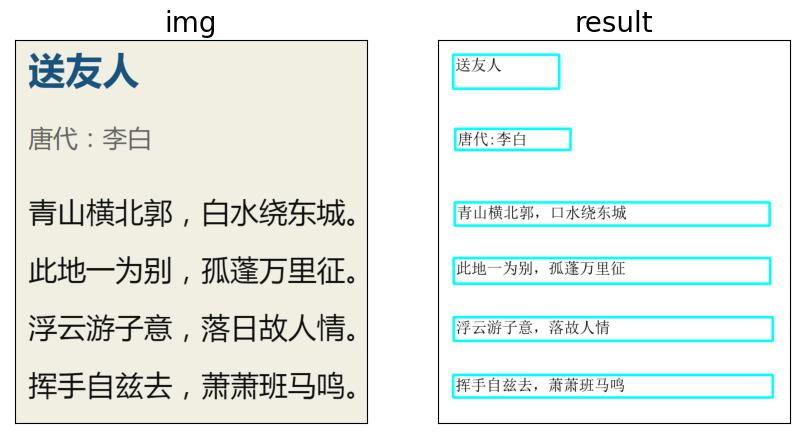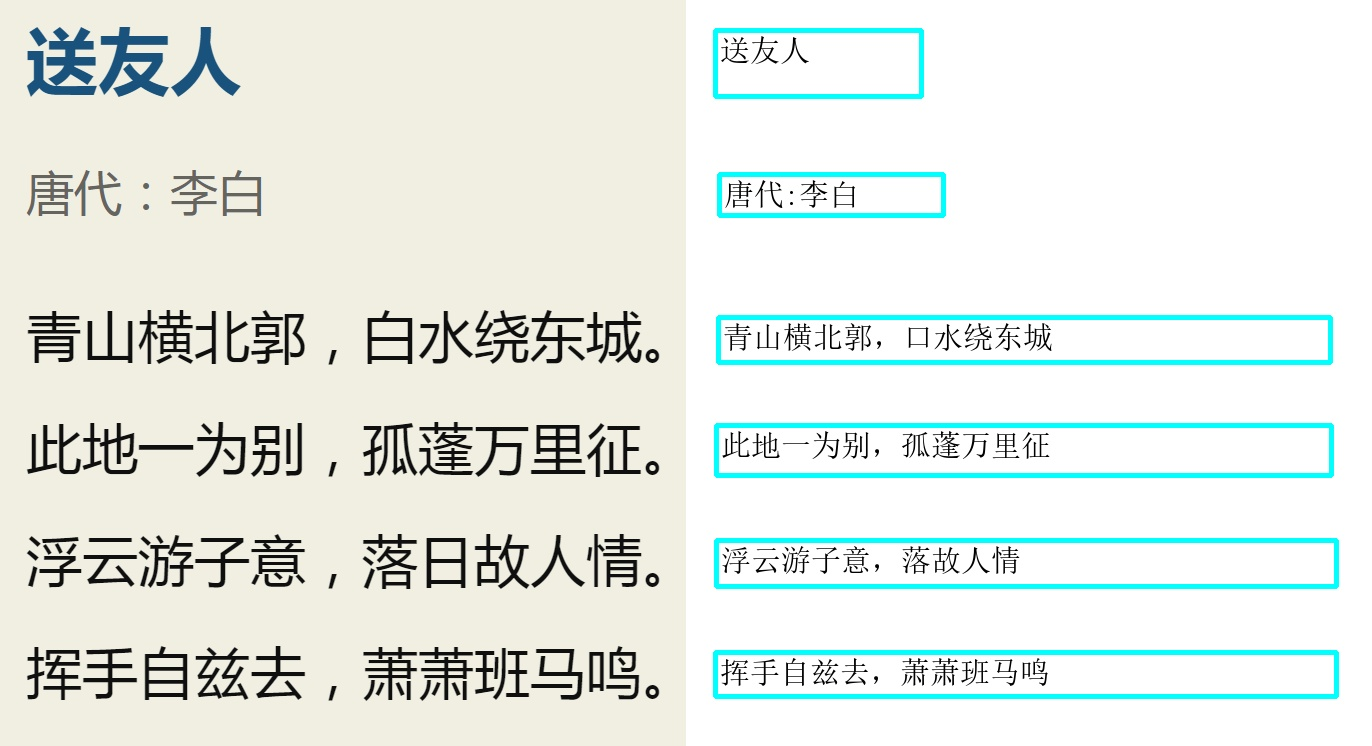[OCR]Python 3 下的文字识别CnOCR
发布时间:2023年12月28日

目录

1? CnOCR
CnOCR?是 Python 3?下的文字识别(Optical Character Recognition,简称OCR)工具包。
工具包支持简体中文、繁体中文(部分模型)、英文和数字的常见字符识别,支持竖排文字的识别。同时,自带了20+个训练好的识别模型,适用于不同应用场景,安装后即可直接使用。
同时,CnOCR也提供简单的训练命令供使用者训练自己的模型。

?2 安装
安装cnocr的命令如下:
pip --default-timeout=100 install cnocr -i http://pypi.douban.com/simple --trusted-host pypi.douban.com下述的字体文件用于实践中的中文识别结果的展示。
①字体文件
??? SimSun:宋体
??? Microsoft YaHei:微软雅黑
??? FangSong:仿宋
??? KaiTi:楷体
??? STXihei:华文细黑
??? STSong:华文宋体
??? STKaiti:华文楷体
??? STFangsong:华文仿宋
??? SimHei:黑体
②下载地址
部分中文字体文件下载
链接: https://pan.baidu.com/s/1pCEreBBHPJKLmWPJmh4OPg 提取码: hope
?3 实践
- ①代码
from cnocr import CnOcr
import matplotlib.pyplot as plt
from PIL import Image, ImageDraw, ImageFont
import cv2
import numpy as np
def get_bbox(array):
"将结果中的position信息的四个点的坐标信息转换"
x1 = array[0][0]
y1 = array[0][1]
pt1 = (int(x1), int(y1))
x2 = array[2][0]
y2 = array[2][1]
pt2 = (int(x2), int(y2))
return pt1, pt2
def dealImg(img):
b, g, r = cv2.split(img)
img_rgb = cv2.merge([r, g, b])
return img_rgb
def create_blank_img(img_w, img_h):
blank_img = np.ones(shape=[img_h, img_w], dtype=np.int8) * 255
# blank_img[:, img_w - 1:] = 0
blank_img = Image.fromarray(blank_img).convert("RGB")
blank_img = blank_img.__array__()
return blank_img
def Draw_OCRResult(blank_img, pt1, pt2, text):
cv2.rectangle(blank_img, pt1, pt2, color=[255, 255, 0], thickness=3)
data = Image.fromarray(blank_img)
draw = ImageDraw.Draw(data)
fontStyle = ImageFont.truetype("ChineseFonts/simsun.ttc", size=30, encoding="utf-8")
(x, y) = pt1
draw.text((x+5, y+5), text=text, fill=(0, 0, 0), font=fontStyle)
blank_img = np.asarray(data)
# cv2.putText(img, temp["text"], pt1, cv2.FONT_HERSHEY_SIMPLEX, 0.8, (0, 0, 0), 2)
return blank_img
def _main(img_path):
im = cv2.imread(img_path)
img_h, img_w, _ = im.shape
blank_img = create_blank_img(img_w, img_h)
# 所有参数都使用默认值
ocr = CnOcr()
result = ocr.ocr(img_path)
# print(result)
for temp in result:
print(temp["text"])
# print(temp["score"])
pt1, pt2 = get_bbox(temp["position"])
blank_img = Draw_OCRResult(blank_img, pt1, pt2, temp["text"])
fig = plt.figure(figsize=(10, 10))
im = dealImg(im)
img = dealImg(blank_img)
titles = ["img", "result"]
images = [im, img]
for i in range(2):
plt.subplot(1, 2, i + 1), plt.imshow(images[i], "gray")
plt.title("{}".format(titles[i]), fontsize=20, ha='center')
plt.xticks([]), plt.yticks([])
# plt.subplots_adjust(left=None, bottom=None, right=None, top=None, wspace=0.3, hspace=0)
# plt.tight_layout()
plt.show()
fig.savefig('test_results.jpg', bbox_inches='tight')
if __name__ == '__main__':
_main("test.png")
pass
- ①结果图

- ②代码
from cnocr import CnOcr
from PIL import Image, ImageDraw, ImageFont
import cv2
import numpy as np
def get_bbox(array):
"将结果中的position信息的四个点的坐标信息转换"
x1 = array[0][0]
y1 = array[0][1]
pt1 = (int(x1), int(y1))
x2 = array[2][0]
y2 = array[2][1]
pt2 = (int(x2), int(y2))
return pt1, pt2
def dealImg(img):
b, g, r = cv2.split(img)
img_rgb = cv2.merge([r, g, b])
return img_rgb
def create_blank_img(img_w, img_h):
blank_img = np.ones(shape=[img_h, img_w], dtype=np.int8) * 255
# blank_img[:, img_w - 1:] = 0
blank_img = Image.fromarray(blank_img).convert("RGB")
blank_img = blank_img.__array__()
return blank_img
def Draw_OCRResult(blank_img, pt1, pt2, text):
cv2.rectangle(blank_img, pt1, pt2, color=[255, 255, 0], thickness=3)
data = Image.fromarray(blank_img)
draw = ImageDraw.Draw(data)
fontStyle = ImageFont.truetype("ChineseFonts/simsun.ttc", size=30, encoding="utf-8")
(x, y) = pt1
draw.text((x+5, y+5), text=text, fill=(0, 0, 0), font=fontStyle)
blank_img = np.asarray(data)
# cv2.putText(img, temp["text"], pt1, cv2.FONT_HERSHEY_SIMPLEX, 0.8, (0, 0, 0), 2)
return blank_img
def _main(img_path):
im = cv2.imread(img_path)
img_h, img_w, _ = im.shape
blank_img = create_blank_img(img_w, img_h)
# 所有参数都使用默认值
ocr = CnOcr()
result = ocr.ocr(img_path)
# print(result)
for temp in result:
print(temp["text"])
# print(temp["score"])
pt1, pt2 = get_bbox(temp["position"])
blank_img = Draw_OCRResult(blank_img, pt1, pt2, temp["text"])
images = np.concatenate((im, blank_img), axis=1)
cv2.imwrite('OCR_result.jpg', images)
if __name__ == '__main__':
_main("test.png")
pass
- ②结果图

茫茫人海,遇见便是缘,愿君事事顺心,一切都好。 感恩遇见!
文章来源:https://blog.csdn.net/wss794/article/details/135268900
本文来自互联网用户投稿,该文观点仅代表作者本人,不代表本站立场。本站仅提供信息存储空间服务,不拥有所有权,不承担相关法律责任。 如若内容造成侵权/违法违规/事实不符,请联系我的编程经验分享网邮箱:chenni525@qq.com进行投诉反馈,一经查实,立即删除!
本文来自互联网用户投稿,该文观点仅代表作者本人,不代表本站立场。本站仅提供信息存储空间服务,不拥有所有权,不承担相关法律责任。 如若内容造成侵权/违法违规/事实不符,请联系我的编程经验分享网邮箱:chenni525@qq.com进行投诉反馈,一经查实,立即删除!
最新文章
- Python教程
- 深入理解 MySQL 中的 HAVING 关键字和聚合函数
- Qt之QChar编码(1)
- MyBatis入门基础篇
- 用Python脚本实现FFmpeg批量转换
- es倒排索引以及分词
- 【Linux】Linux脚本 log函数使用技巧
- HDMI2.1输入转4Port MIPI/LVDS输出,嵌入式SPI闪存固件存储,VR和AR应用首选国产芯片方案-LT6911GXC
- 宏景eHR get_org_tree.jsp SQL注入漏洞复现
- 启山智软/B2C商城源码二开,B2C商城诸多优点
- 2023.12.27 linux命令行输出的颜色配置
- 回顾2023,那些令 AI 圈大地震的瞬间!
- AntDB数据库新携手:六大优势引领企业数智化转型风潮
- 非线性方程求根迭代法(C++)
- 探秘“万年历”: 久远新科技的灵感源泉